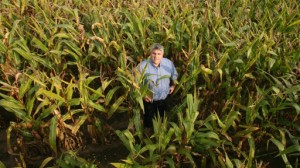Agrimoney | 24 June 2010
More than 20 years after the fall of the Berlin Wall, a gulf still exists between farm prices in eastern and western Germany which provides a "good opportunity" for investors, a boss at KTG Agrar has said.
While prices of east German land have jumped by 150% over the last six years, five times as fast as those in the former West Germany, they remain at a 60% discount, Thomas Berger, the farm operator's chief accounting officer said.
This gap, equivalent to more than E15,000 a hectare, is unsustainable, given the lack of any significant difference in land quality or ability to get crops to markets.
"There is no real reason that prices are so much lower," Dr Berger told agricultural investors.
"We believe the prices will come together, there will be convergence. It is a good opportunity."
Impact on returns
The Hamburg-based group, which farms 24,300 hectares of land in Germany and 6,200 hectares in Lithuania, had implemented a "very strong focus on farmland growth" to take advantage of the gap.
"If you can buy the land so much cheaper it raises the return you can get from farming that land, even before you look at land price rises," Dr Berger told Agrimoney.com.
"There are not big differences between east and west Germany. There is one rule of law."
He attributed the gap to the reluctance of highly trained western German investors, and their money, to move east to exploit the opportunity.
"It is not like London. You cannot just say 'I will go to the theatre tonight'," he said.
'Matter of time'
The comments - which co-incided with KRG Agrar's announcement of its first ever dividend, of E0.10 a share – came at the Agriculture Outlook conference in London, which heard that land in Bulgarian and Romania also represented an "interesting" investment as prices caught up with those in western Europe.
"There are very low prices, and there is a level playing field to compete on, as they are part of the European Union," Erik Jantzen, the chief executive of Danish based Jantzen Development, said.
"They will catch up. It's just a matter of time. It is a unified market."
However, he highlighted dangers to investing in the countries, including dealing with a fragmented Romanian farmland system in which there were 5m owners, each possessing an average of 2 hectares each.













